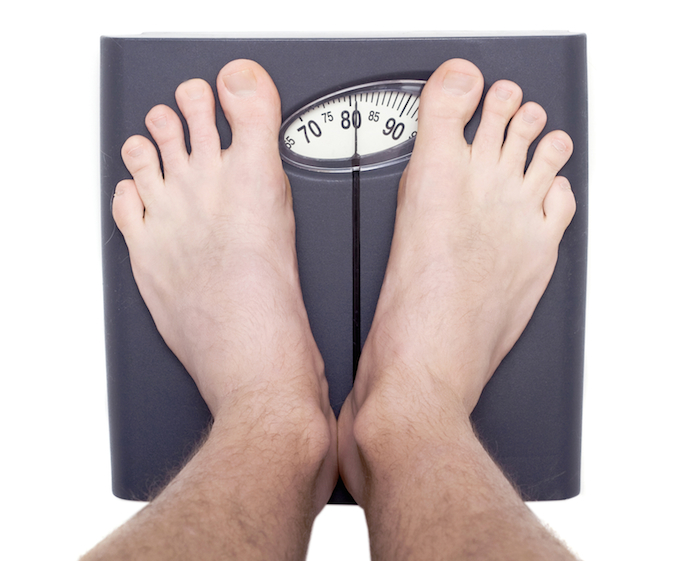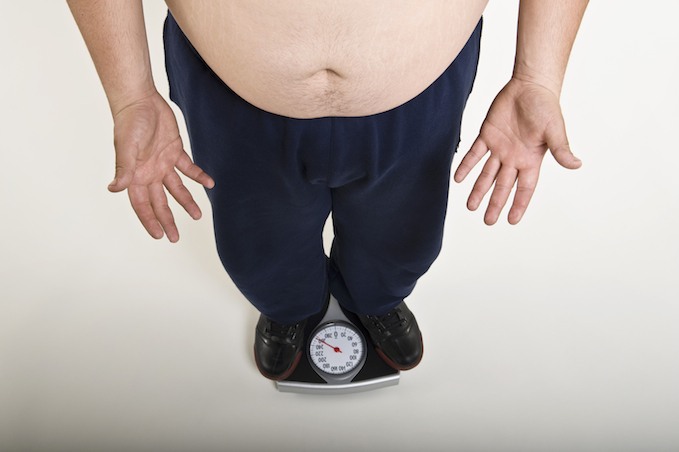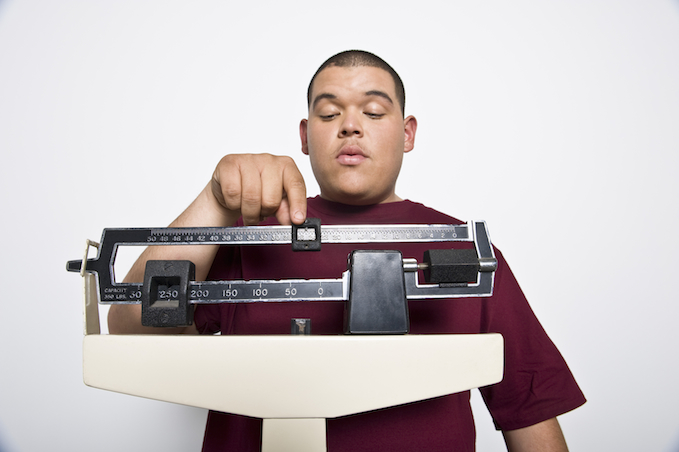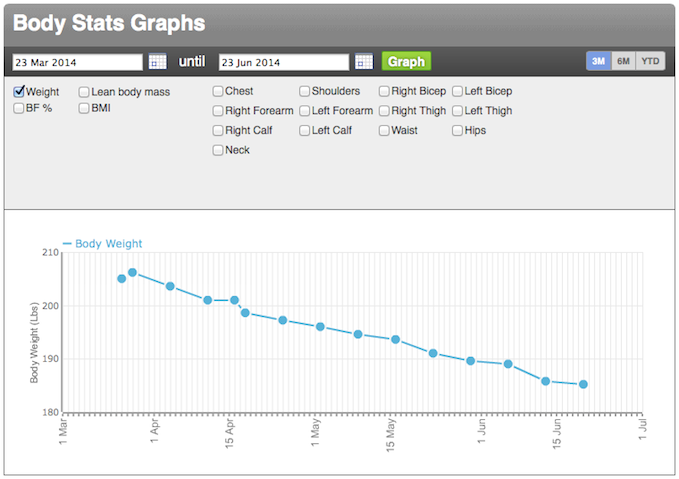How To Weigh Yourself Properly

When you are trying to gain muscle or lose fat, accurately tracking changes in your weight is one of the best barometers of your progress.
And, really, it sounds pretty easy to do right?
You buy yourself a scale, you stand on it – and tah-dah, you have successfully weighed yourself!
However, I’m going to put forward a different position here: weighing yourself isn’t nearly as straightforward as many people think!
If you currently adopt a haphazard approach to measuring your weight – and by that I mean getting on the scale at random intervals, whenever you feel like it – then this article is for you.
And trust me on this one – if you learn how to take your weight properly and consistently, your journey to getting the type of body you want will be far easier, more predictable, and far less frustrating.
The Importance Of Weighing Yourself Regularly
Before we get into all of that, however, I want to address the why of this first.
Why should you bother weighing yourself at all? I mean, it’s just another thing you have to remember to do, right?
And if the scale doesn’t give you the number that you wanted, it can feel like a rough start to the day.
But even with all of that being true, you still need to be tracking your weight if you want to maximize your progress.
Here’s why:
- You’ll know exactly where you stand: Unlike its more vague cousin – the mirror – your scale doesn’t lie. It is one of the easiest and most effective ways to get an objective sense of where you are right now.
- You’ll be able to see how you’re progressing: It is far-too-easy to spin your wheels when working out. I should know, there have been entire years where I haven’t made progress simply because I refused to track things. But the truth is that without measuring your week-to-week changes in weight, you won’t know if what you are doing – workout and diet-wise – is working or if you need to make some adjustments.
- It can be a great motivational tool: You have the choice of having your scale be your enemy or your friend. If you choose to develop a pattern of weighing yourself consistently, and adjusting what you are doing accordingly, the scale becomes an indispensable way to gauge the exact progressions that you’ve made each month. And when you don’t feel like going to the gym that morning, the firm knowledge that you have already lost 27.6 pounds in the last 3 months will serve as welcome encouragement.
- It keeps you honest and on track: When you’re stressed and busy, it can be easy to have lapses in willpower. For many people, one of the first things to go is their diet. However, if you have a strict routine where you measure your weight at certain intervals, you’ll be more likely to stick to your guns and not have that piece of cake, since you’ll be more conscious of the potential impact of that decision.
Why Weighing Yourself Is Deceptively Challenging
OK, so now that we’ve established that weighing yourself is important, why does it deserve its own article?
Well, from my experience, I would say that improper use of bathroom scales is one of the biggest causes of needless frustration, discouragement – and in some cases obsession – among people trying to get in shape.
This is because when you’re weighing yourself, you are working with fairly small changes within any given time period.
If you lose a pound or 2 every week, on average, then you are doing very well.
The same is true if you are trying to gain some muscle – going up in weight even 0.5-1 pound per week is excellent if most of it is muscle gain.
However, because you are working with these small numbers, accuracy truly is everything.
Otherwise, you’ll potentially face a situation something like this:
Monday: It’s the first day of your new diet. You wake up, have a shower, and then decide that it’s probably a good time to weigh yourself. The scale stares back at you with a reading of 212.9. At least you know where you stand.
Tuesday: You get home from work, eat dinner, and decide to sneak in some ice-cream before watching TV. 30 minutes into the show you feel guilty about the ice-cream, so you trudge to the bathroom to visit the scale of penance. It now tells you that you weigh 214.6 pounds. You feel sad and go to bed.
Wednesday: You don’t weigh yourself – screw scales and their vicious lies!
Thursday: It’s morning again. You look over at the scale as you relieve yourself. It eyes you back, suspiciously. You decide today is not the day.
Friday: Awesome, it’s friday! And because it’s friday, you have no time for that tedious, deceitful scale. So back under the bed it goes, collecting dust until you decide to pull it out several months later to repeat the same pattern.
Yes, I am exaggerating a bit here – but this really isn’t very far from the truth for many people. Hell, I’ve done this myself (more than once), so I know how it goes…
The thing is, there are a lot of variables that go into how much you weigh at any given time.
These include how much you’ve eaten recently, how much you’ve had to drink, your water retention levels, the time of day it is, and when you last went to the bathroom.
Factors like this can literally account for fluctuations of multiple pounds, making it difficult to get an accurate sense of how much (or little) progress you’ve actually made.
How To Weigh Yourself Accurately
So how do you actually start deriving some benefit from your bathroom scale, instead of being frustrated by it like the person in the story above?
Simple – you just need to weigh yourself in the same way at the same time each week.
But let’s break this down further and get to some specifics…
We’ve already discussed how your weight can fluctuate day-to-day – and even hour-to-hour – based on all sorts of factors.
And with so many possible variables, how can you possibly get a meaningful measurement of your weight?
Well, the most effective approach to this – and what I have my clients do – is to pick one morning of the week, right after you get up, and weigh yourself at exactly that time each week.
That’s it.
You won’t weigh yourself any more than that, and you won’t weigh yourself any less.
Once a week, at the same time (when you first get up), on the same day of the week.
For most people, it won’t matter which day you decide to pick – but if you are on a diet that has significant caloric fluctuations (for instance, if you carb/calorie cycle on certain days), then you’ll want to pick the day that you feel is most representative.
Inevitably, you’ll find that weighing yourself like this takes a lot of the stress out of the process.
You won’t be concerned with day-to-day fluctuations – and you won’t emotionally make false conclusions from them.
This makes the process systematic and meaningful, instead of erratic and confusing.
Here are a few other things that you should bear in mind:
Weigh yourself naked:
Yes, that includes your underwear too! You definitely don’t want to be wearing any clothing at all when you weigh yourself, since all that does is create needless inaccuracies. Do it either just before or after your morning shower.
Weigh yourself after you go to the bathroom:
Most people go to the bathroom pretty soon after they get up, so this shouldn’t be a problem – but you should always make sure to go before you step on the scale. Again, this is to eliminate inconsistencies as much as possible.
Weigh yourself in the morning:
As I mentioned before, the morning is the best time to weigh yourself each week. You have just effectively fasted for 8+ hours, so this will be the most consistent time to get a sense of how much weight you are gaining or losing.
Don’t eat or drink anything first:
This should go without saying, but don’t eat breakfast before weighing yourself. Don’t even have a glass of water!
Measuring Your Progress
Once you implement your weighing schedule, you’ll obviously want to track your progress week-to-week.
After all, that is the whole reason that you are weighing yourself in the first place!
To do this, you can use either a notepad, an online app like MyFitnessPal or FatSecret – or, if you’re a Caliber Fitness member, you can use our iPhone/Android app to log your weekly weight changes, which has the advantage of allowing your trainer see how you’re progressing.
However, when you’re tracking your weekly weight changes, you should be aware of one important point…
Weight loss doesn’t follow a consistent, linear pattern – even if you are perfectly sticking to your diet and workout plan.
Instead, your body tends to lose larger amounts of weight some weeks, and less other weeks.
This should not be seen discouraging; believe me, this is just the way it goes.
And, yes, there is an explanation for why this happens, but that is beyond the scope of this particular article.
So, to avoid stressing out about it, you should look at your weight loss (or weight gain) in 3 week blocks of time.
For instance, let’s say that you are trying to loss 1 pound a week.
The first week you lose 1.3 pounds.
The second week you only lose 0.4 pounds.
However, the third week you loss 1.4 pounds again.
This means that in 3 weeks you have lost 3.1 pounds – which actually exceeds the goal of 1 pound per week.
What To Do If You’re Not Making Progress
If in any given 3 week period of time, your weigh-ins don’t add up to the target amount of weight you are trying to lose or gain, then it’s time to make some adjustments.
In most cases, this simply means increasing or decreasing the amount of calories that you are eating.
Start with a 10% increase or decrease in your calories, and then see how that impacts your weight change for the next 3 week period.
Remember, you don’t want to make changes after 1 random week where you didn’t make progress.
If you do this, you will often pointlessly sabotage your progress when if you just waited another week it would have completely evened out.
Which Scale Should You Use?
If you already have a bathroom scale that you think is accurate, then that is probably fine.
And even if it isn’t completely accurate, what matters most is relative changes, not absolute ones.
I mean, who cares if another scale somewhere else has you pegged at 2 pounds lighter or heavier; what matters is that you are making consistent progress, and even the most basic scale can generally handle that just fine.
On that note, you should obviously weigh yourself with the same scale each week.
Using a different scale is another variable that you don’t want to mess with, so once you’ve picked your scale, stick to using it!
Now, if you don’t already have a scale – or don’t have one that you’re happy with – then there are a lot of options out there to pick from, with very different price points.
You’ll find everything from basic $20 scales that just measure your weight, to fancy $300+ ones that also track your water retention, measure your bone density, etc.
We’ll explore some of the things to look for when purchasing a new scale in our follow-up article. Look out for it next week.


